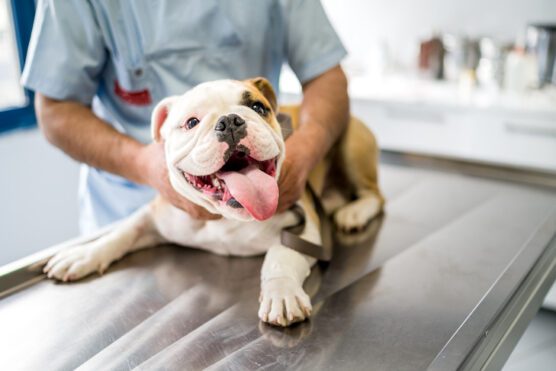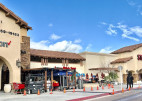The Los Angeles County Department of Animal Care and Control has seen an increase in cases of Canine Parvovirus among dogs and puppies admitted to its animal care centers. DACC urges pet owners to take preventive measures to protect their canine family members in the Antelope Valley.
Canine Parvovirus, commonly known as “Parvo,” is a viral disease that primarily affects puppies and unvaccinated dogs. It can lead to severe gastrointestinal distress, dehydration, and even death if left untreated. Clinical signs usually begin between 5-7 days after infection but can range between 2-14 days. The most common signs of parvo are lethargy, loss of appetite, vomiting, and diarrhea. The disease is diagnosed through a physical exam and fecal test. While parvo can be treatable, it must be caught early to be successful. Treatment is intensive and includes supportive care to help battle dehydration and other potential secondary infections.
DACC Senior Veterinarian Dr. Rachelle Saelor expressed her concerns, saying, “Parvovirus is highly contagious and can survive in the environment for months, even years in dark and damp environments. We urge residents to take proactive measures to prevent this disease, and to consult your veterinarian as soon as you suspect your pet is sick to prevent further spread.”
To prevent further spread of Parvovirus in the Antelope Valley, DACC provides these recommendations for pet owners:
Vaccinate Your Dogs: Ensure that your pets are up to date with their vaccinations, including the Parvovirus vaccine. Puppies should receive a series of vaccinations to build immunity.
Practice Good Hygiene: Properly disinfect areas where dogs have been, especially in public spaces such as parks and sidewalks. Parvovirus can survive on surfaces for extended periods of time. Maintain proper biosecurity of your home and yard by properly cleaning and disinfecting regularly.
Isolate Sick Dogs: If your dog shows any symptoms of Parvovirus, such as vomiting, diarrhea, lethargy, or loss of appetite, isolate them from other dogs immediately and seek veterinary care.
Consult a Veterinarian: Regular check-ups and consultations with a veterinarian are essential to monitor your dog’s health and address any concerns promptly. If you think your pet may have contracted parvovirus, act immediately.
Educate Others: Spread awareness about the importance of Parvovirus prevention within your community. Encourage fellow pet owners to vaccinate and practice good hygiene.
DACC provides accessible vaccination clinics and educational resources to the community through Vet@thePark, a subprogram of the Pets Are Family Program.
“DACC is carefully monitoring the increase in parvovirus cases and is providing vaccination clinics to this high-need area” said DACC Director Marcia Mayeda “We all want to keep our beloved pets safe and healthy, and DACC is determined to help this community do just that.”
The following vaccination clinics are scheduled for the Antelope Valley and Santa Clarita areas in 2023:
Low-Cost Vaccine Clinics at the Animal Care Centers:
Sept. 21 – Lancaster ACC
Sept. 26 – Palmdale ACC
Oct. 23- Castaic ACC
Oct. 20- Lancaster ACC
Oct. 24- Palmdale ACC
Vet@thePark Events (Free Vaccine Clinics)
Oct. 14 – “BarkTober” at El Cariso Park, (Hosted by: Castaic ACC)
Oct. 29 – 1002 E Ave Q12 (Hosted by: Palmdale ACC)
Nov. 19- 27150 Bouquet Canyon Road (Hosted by: Castaic ACC)
Dec. 10- Lancaster Park, (Hosted by: Lancaster ACC)
For more on DACC’s Pets Are Family Program, click here.
Like this:
Like Loading...
Related





 Tweet This
Tweet This Facebook
Facebook Digg This
Digg This Bookmark
Bookmark Stumble
Stumble RSS
RSS




























REAL NAMES ONLY: All posters must use their real individual or business name. This applies equally to Twitter account holders who use a nickname.
0 Comments
You can be the first one to leave a comment.